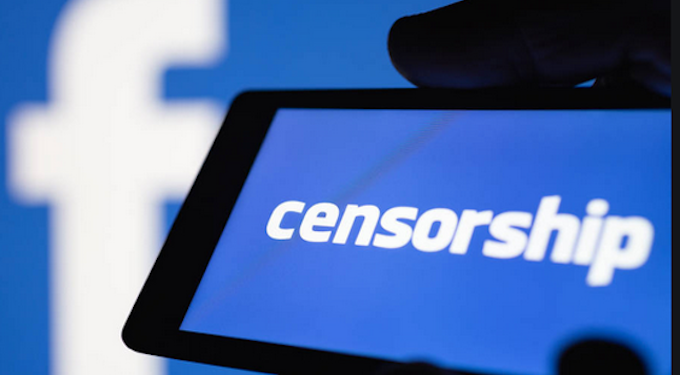Facebook – or Meta, as it now calls itself – has requested feedback from the public on its approach to handling COVID-19 ‘misinformation’. Or, rather, Meta has asked for policy advice in this area from its Oversight Board and the Oversight Board, in turn, is asking for comment from the public.
These are the different approaches Meta has asked the Oversight Board to consider:
- Continue removing certain COVID-19 misinformation. This option would mean continuing with Meta’s current approach of removing content that directly contributes to the risk of imminent physical harm. Meta states that under this option the company would eventually stop removing misinformation when it no longer poses an imminent risk of harm and requests the Board’s guidance on how the company should make this determination.
- Temporary emergency reduction measures. Under this option, Meta would stop removing COVID-19 misinformation and instead reduce the distribution of the claims. This would be a temporary measure and the company requests the Board’s guidance as to when it should stop using it if adopted.
- Third-party fact checking. Under this option, content currently subject to removal would be sent to independent third-party fact checkers for evaluation. Meta notes that “the number of fact-checkers available to rate content will always be limited. If Meta were to implement this option, fact-checkers would not be able to look at all COVID-19 content on our platforms, and some of it would not be checked for accuracy, demoted, and labeled.”
- Labels. Under this option, Meta would add labels to content which would not obstruct users from seeing the content but would provide direct links to authoritative information. Meta considers this a temporary measure and seeks the Board’s guidance on what factors the company should consider in deciding to stop using these labels.
The specific areas the Oversight Board is seeking “comment” from the public on are:
- The prevalence and impact of COVID-19 misinformation in different countries or regions, especially in places where Facebook and Instagram are a primary means of sharing information, and in places where access to health care, including vaccines, is limited.
- The effectiveness of social media interventions to address COVID-19 misinformation, including how it impacts the spread of misinformation, trust in public health measures and public health outcomes, as well as impacts on freedom of expression, in particular civic discourse and scientific debate.
- Criteria Meta should apply for lifting temporary misinformation interventions as emergency situations evolve.
- The use of algorithmic or recommender systems to detect and apply misinformation interventions, and ways of improving the accuracy and transparency of those systems.
- The fair treatment of users whose expression is impacted by social media interventions to address health misinformation, including the user’s ability to contest the application of labels, warning screens, or demotion of their content.
- Principles and best practice to guide Meta’s transparency reporting of its interventions in response to health misinformation.
Anyone can submit a response, although there are rules about the form the response should take. The deadline is 11am EDT tomorrow. See here for more detail.
I will publish my response shortly.












To join in with the discussion please make a donation to The Daily Sceptic.
Profanity and abuse will be removed and may lead to a permanent ban.
Chris Morrison, have you seen this? A paper with evidence that the sun affects the climate, not carbon.
https://x.com/NikolovScience/status/1825929760175739247
And we had the recent papers by Kubicki et al that set the saturation point for CO2 to affect the atmosphere at 300ppm – we currently have 400ppm.
Which leaves ECS as the only possible “culprit” – and estimates of this get lower by the year
“it is not an effective decarbonisation tool for use in homes and buildings”——-But along the coast from where I live in a town called Buckhaven over 200 residents have been having hydrogen piped into their houses to replace gas central heating. They were given free boiler etc. One resident according to a friend who lives in that scheme has refused to accept the bribe because he did his sums and realised that the cost of the hydrogen would be excessive. There was also an article in the Herald that reported the company installing this would not release safety data. —-Go figure.
Philipsfield Secondary Modern, 1st year Physics lesson:
“Now class, today’s challenge revolves around our previous discussions about conservation of energy –
Would it be more sensible to take a highly concentrated form of energy – petrol – to directly power cars or instead use a weak and unreliable form of energy – wind – to generate electricity which would in turn be used in the highly energy-intensive process of extracting hydrogen from water, this leaky and volatile substance eventually being used to power an entire new fleet of vehicles which everyone would be obliged to buy to replace their current ones with?”
The teacher looked at the sea of bemused faces before cracking into a broad grin “Trick question, of course!”
Green hydrogen will be created by the electrolysis of water using “spare” wind and solar electricity. Then it will be stored to provide ‘battery’ back-up when the wind and solar electricity is not available, whereupon the green hydrogen will be burnt in gas-fired power stations to produce electricity…. emitting ‘green’ CO2.
Now class: write a 200 word essay on the scientific and economic idiocy of this project.
My essay: The whole concept is fantasy, science fiction and economic nonsense! There my synopsis powers must be great! The other 190 odd words would simply describe the idiots behind all this in very unpleasant terms.
Re stratospheric water vapour … surely we just need to develop a satellite constellation of giant dehumidifiers and put them into orbit … powered by solar panels … pipe the captured water back into the ocean. C’mon man, use science creatively!
No, no!. There’s too much water in the Pacific already. António said so. Have to pipe it to the Moon instead.
Already in hand. Those ‘planned’ huge orbiting solar panels can be used to focus on the stratospheric water vapour and boil it off into space.
Water vapour in the stratosphere would gradually form huge clouds of ice and already be there. There is no water vapour at -60C or lower! All the water collects at about 20,000 feet or less as you will have noticed if you travel by plane. Water state changes are controlled by temperature, ie. steam, water vapour, liquid, ice. The air is very dry when the temperature is below zero, now why is that? Because water vapour condenses to water at 0C.
Let us imagine that the UK solves the problems of making Green hydrogen, and the problems of distributing it and burning it safely and creates working hydrogen storage caverns (oh come on, that’s only three impossible things and you should have finished breakfast already)…
Brilliant: we’ve solved our ‘fossil fuel problem’.
However, what of the rest of the world? Many countries won’t be as lucky as the UK to have geology suitable for hydrogen storage. They will either have to give up the Green madness* or they will develop some other as yet unknown technical ‘solution’ to energy generation, distribution and consumption. If we go down the salt cavern storage road we’ll be in a technological dead end; we need to adopt a ‘solution’ which can be applied worldwide.
The new technology to pursue is fusion – it’s only 30 years away they say. Meanwhile we have a good working technology in natural gas.
*Of course, to actually give up the Green madness other countries would have to have been paying a bit more than lip-service to it.
Fusion has been ‘only’ 30 years away every year of my life since I was about 15 years old – I’m now 71. It is the energy of the future and always will be.
Spot on. 🙂
But fusion power is more realistic than hydrogen storage under Cheshire.
You have to handle hydrogen with extreme care to get it to explode. Let it loose in the atmosphere and it’s so light it will escape the Earth into space. The Hindenberg burned it didn’t go boom. People typically trap it in an upside down test-tube to create an explosive mixture of hydrogen and oxygen.
Such anti-science alarmism.
The alternative version of the Hindenberg is that it was shot at with an incendiary bullet, fired by a Moe Berg.
https://www.sciencedirect.com/science/article/abs/pii/S0360319922056440
The linked article seems to suggest that it is fairly easy to ‘get it wrong’ with hydrogen.
Must have taken a lot of fire-lighters then to get the Sun going.
Hydrogen gas is highly flammable and forms an explosive mixture in air in concentrations of between 4% and 74%.
In a confined space such as a kitchen or living room – I think you will get your ‘boom’ due to the rapid compression of the air, should it ignite, just as you do with natural gas, but it will ‘boom’ at lower concentrations in air than natural gas.
Hydrogen gas cannot defy gravity and fly off into space: Exhibit A – that big ball of hydrogen in tte sky called the Sun.
“Blackouts and severe rationing will be inevitable”.
Rationing is a feature of the system, not a bug.
And what has this to do with green hydrogen? Is hydrogen from other sources and better?
Tomorrow we will reveal how organically grown tobacco damages your health.
a modern industrial society
The mistake is to think that this is what Militwat wants.
And from this article clearly the Millipede has no clue whatsoever about how his utopia can be achieved.
https://davidturver.substack.com/p/stark-sends-out-sos
It is a mistake to assume Socialists want to replace what exists with something better – destruction of what we have is the reward.
Just like vandals who destroy a bus shelter or park bench, they don’t want to replace them with something better, it’s just the sheer joy of destroying that thrills.
All in all, hydrocarbons look like a good alternative to renewables. Better cars and lorries, there when needed, less environmental impact, way cheaper, tiny footprint, pipework there for gas, grid there for electricity.
This is huge, surely! How can the media not be shoving this under the nose of glazed-over nutcases like Miliband? But they won’t – and even if they do, the glow of the Soros billions will outshine it.
If there is no climate emergency, why even bother to discuss hydrogen?
‘There is no cost effective, feasible, reliable and scalable replacement for hydrocarbons.’ Eh? Has CM never heard of Small Modular Reactors? They tick all his boxes. Oil for most forms of transport, gas for heating and cooking, SMRs to produce electricity – job done.
Good article, but those of us who say this kind of thing to Government are regularly cancelled. The lack of scientific knowledge in Government, the CS etc. is astounding, and the lack of interest even worse. This should all be put to Millibrain in a prime time TV programme at least half an hour long, so that he might understand! No chance the BBc though, they are worse if that is possible.
Marvellous article. Another dead end for the Net Zero madness.
Bravo.
Superb article clearly showing the deliberate catastrophe being engineered by these fraudsters.
For anyone interested, here’s a link to the many graphs etc I have collected re AGW over the years
https://www.mediafire.com/file/uo35er4g4lzni0e/Images.zip/file
And also Javier Vinos series on the sun and climate, published on Judith Curry’s blog
https://www.mediafire.com/file/dnvi9tpchuddyl5/NatureUnbound.pdf/file
323 pages long – but written with the lay person in mind